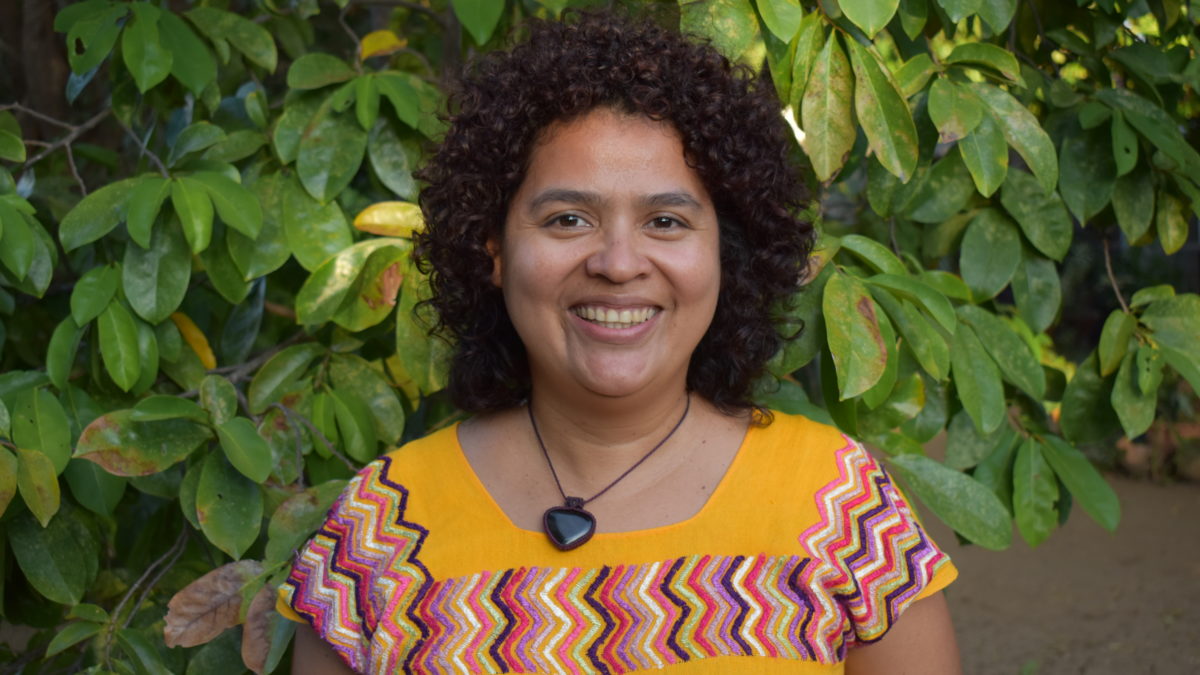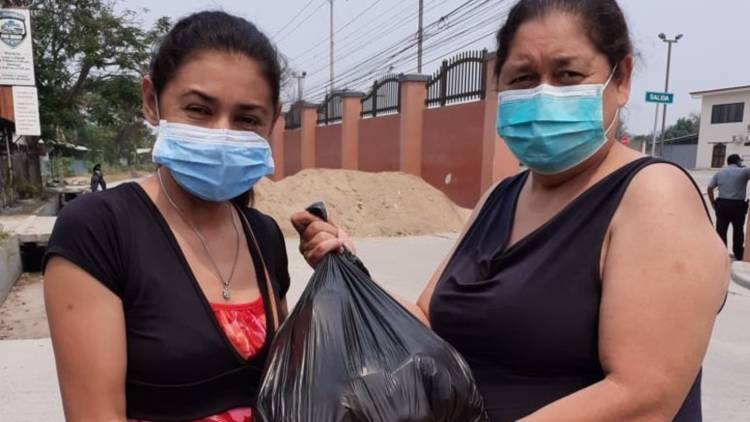Defending land and life in Honduras

During the coronavirus pandemic, the government in Honduras is increasing its repression and stigmatisation of human rights defenders. Furthermore, despite the risks posed by coronavirus for workers, some mining companies are continuing their activities with the approval of the government. Jess Michelmore, from CAFOD’s Latin America team, shares the story of Juana, a human rights defender from Honduras.
“I have reached the extreme of telling my daughters not to say who their mother is. It is hard but I am protecting them.”
Juana is a strong and courageous environmental defender from Honduras. As a member of the municipal committee of Tocoa, she is determined to protect the local environment against the negative impacts of mining projects and large-scale farming.
“I fear that rivers will die, mountains will die, and forests will die. We are already at the point in which what follows next will be murder.”
Read more about coronavirus in Honduras
Destruction of the environment
Honduras is one of the most dangerous countries in the world in which to defend the environment. Tocoa is largely agricultural land. It is filled with high, green mountains, deep valleys and twisting rivers. Large-scale farming and industrial mining activities are already devastating the environment and the local communities.
“The government’s policy has been to make Honduras open to business,” explains Juana. “First, we were affected by the African palm oil industry and now it’s iron ore mining.”
Worryingly, mining is being allowed to take place near vulnerable communities and protected land, including national parks. The vulnerable communities are often not consulted about the projects. Juana is taking a stand.
“Communities do not have access to information until the company is installed by force in their territories and activities begin. A road opened almost 40 metres from the river. There is now sediment in the river – a river where people wash their clothes and people consume water. It is a river which communities depend upon and it is used for our agricultural production.”
Criminalisation of human rights defenders
But those who speak out against these violations are often criminalised themselves. They become targets for hate campaigns by the media. Companies in Honduras use their control of the media to denounce those trying to protect their land.
“The media begins to call us ‘opposers of development’. From there, the persecutions and surveillance begin. In our case, we have eight comrades who are in prison for exercising their right to protest for the protection of water.
“There are many types of impact caused by companies, but the most invisible and the hardest is the violence that they bring to communities. Communities which have historically lived in peace and harmony are now living with constant fear.”
Juana is fully aware of the dangers of being persecuted as a human rights defender. She is forced to find ways to try to protect herself and her family. She regularly changes her mode of transport, the times she arrives at the office each day, and she rarely visits public places.
“These types of situations make us distant from our family but that’s just how things are.”
Despite her fears, Juana is dedicated to her community’s struggle.
“My inspiration is the river and the water. Water is an expression of life. Just as my grandmother passed it down to me, I want to pass it down to my daughters and the generations to come.”
Read more about human rights defenders and coronavirus
Taking a stand
Juana and her community are resisting the mining and extensive farming. They organise marches and make complaints at their public ministry. They have already filed appeals at the Supreme Court because many of the damaging projects are taking place in protected areas.
To support Juana and her community, we are working with lawyers, journalists and researchers at ERIC (the Reflection, Investigation and Communications Team) to stand up for justice. This Jesuit organisation, supported by CAFOD, is helping communities like Juana’s to better understand their rights and to document abuses and violations.
Juana and her community must make these land and water conflicts visible at both a national and international level. Social media is being used to demand hearings for prisoners of conscience – arrested for defending rivers. Press conferences are being organised for family members to speak out on behalf of loved ones. Street demonstrations are being organised in front of the Supreme Court and people in Honduras are being invited to contact their congressional representatives and speak up for justice.
Our advocacy support is linked to a three-year human rights defenders project across Latin America and is partly funded by the European Union. We are focusing support on those who defend land, territory and the environment. Juana is one of these people. She is clear on what needs to be done to stop these violations.
Hopes for the future in Honduras
Respecting communities’ rights
“Prior consultation needs to happen. These companies must respect rights and should respect rights of communities first. There must be free, prior and informed consultation and projects should not be set up without consent.”
Juana strongly believes that the Catholic community has an important role to play in protecting the environment. Our prayer must turn into action. Juana and her community are not giving up. They will continue their fight. Juana says: “The territory, the land and mother earth is really what gives us life. It gives us food, water, air – everything we need to live. For me, defending territory means defending life.”
Coronavirus in Honduras
The number of coronavirus cases in the Central America region is increasing and Honduras is one of the worst-affected countries. Most families in Honduras live day to day and, because of the lockdown, are experiencing rising unemployment, poverty and hunger.

Through our partner in Honduras, ERIC- Radio Progreso, we are raising awareness on coronavirus through radio messages. We are working to end human rights abuses and to fight the lack of transparency in the use of public resources during the pandemic.